The Google Pixel 4 XL Review: Stuck In The Past In 2019
by Andrei Frumusanu on November 8, 2019 11:30 AM EST- Posted in
- Mobile
- Smartphones
- Pixel 4
- Pixel 4 XL
System Performance
One aspect Google Pixel devices have always excelled at is performance. With every generation, Google had opted to customise the BSP stack and improve on Qualcomm’s mechanisms to be able to extract as much performance out of the SoC as possible. In recent years these customisations haven’t been quite as evident as QC’s schedulers became more complex and also more mature. The Pixel 4 again makes use of Qualcomm’s scheduler mechanisms instead of Google’s own Android Common Kernel. The Pixel 4 also arrives with Android Q which is one of the very few devices in our testbench which comes with the new OS version.
We’re testing the Pixel 4 at three refresh rate settings: the default 60Hz mode, the automatic 90Hz mode, and the forced 90Hz mode. As with the OnePlus 7 Pro earlier in the year, we’re expecting to measure differences between the different display modes.
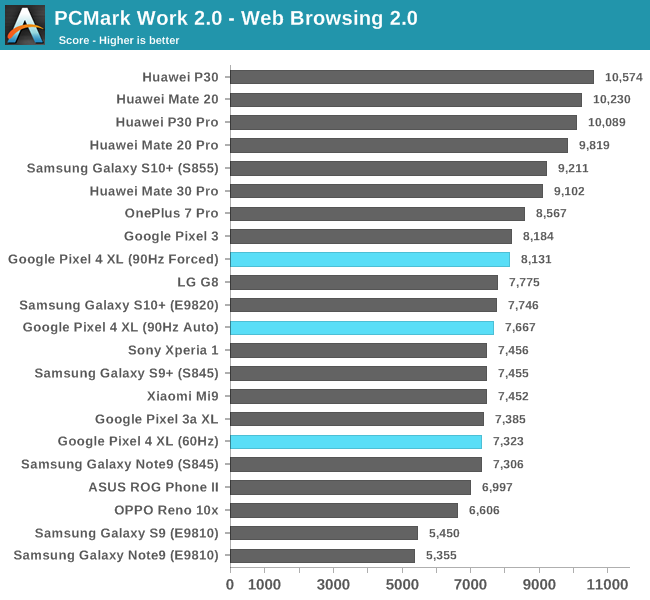
Starting off with the web browsing test, we’re seeing the Pixel 4 XL perform quite averagely. The odd thing here is that it’s showcasing worse performance and scaling than the Pixel 3 last year in all but the forced 90Hz mode. It’s also interesting to see how the forced 90Hz mode is able to post an advantage over the regular 90Hz mode even though the content of the benchmark doesn’t contain anything in particular that would have the automatic mode trigger to 60Hz.
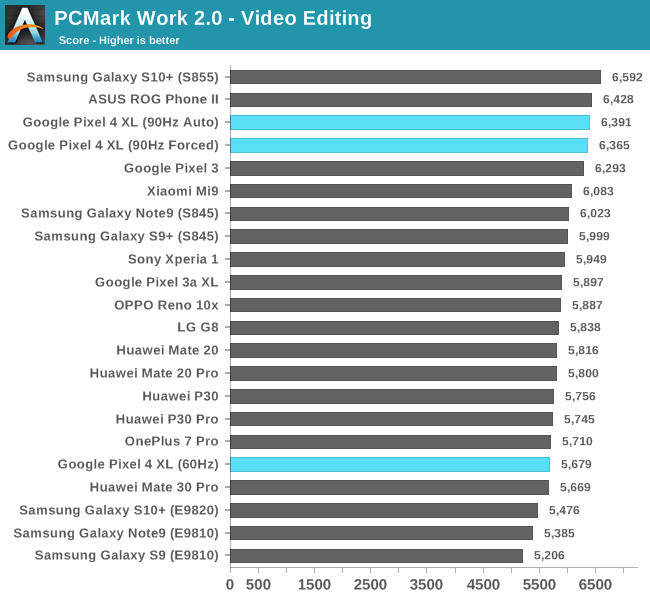
In the video editing test, which isn’t all that significant in terms of its results, we do however see the differences between the 60 and 90Hz modes. Again, it’s odd to see the 60Hz mode perform that much worse than the Pixel 3 in this test, pointing out to more conservative scaling of the little CPU cores.
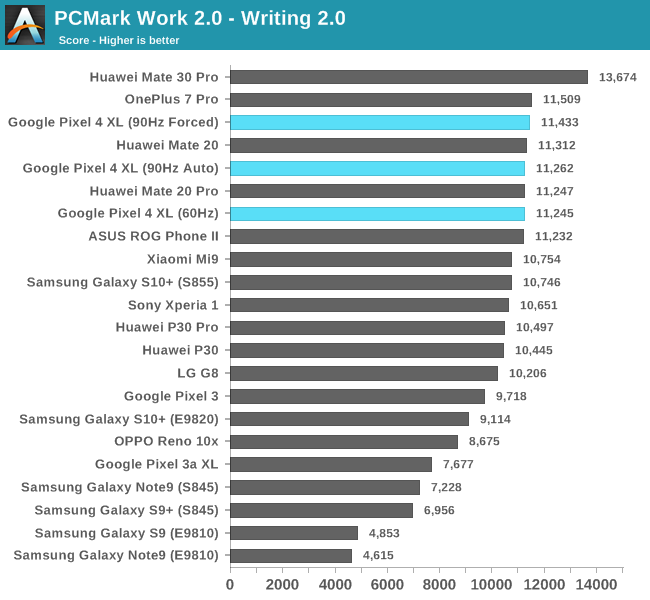
In the Writing test which is the most important sub-test of PCMark and has heavier workloads, we see the Pixel 4 perform very well and is in line with the better Snapdragon 855 devices out there.
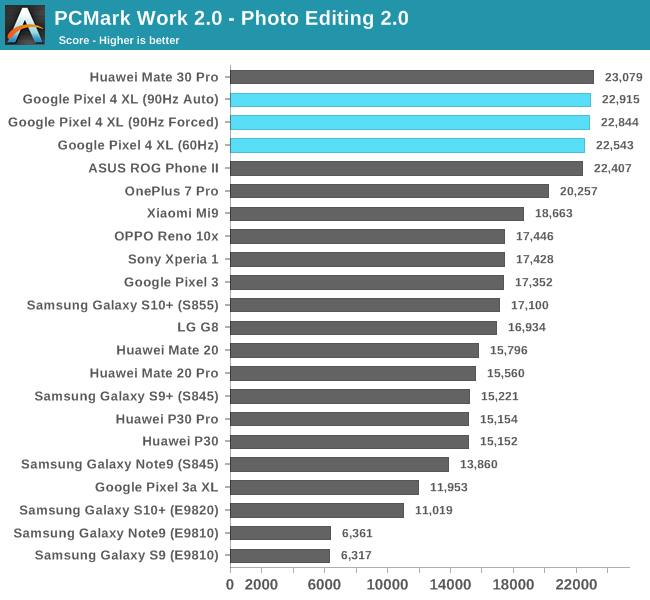
The Photo Editing scores of the Pixel 4 are also top notch and the best Snapdragon 855 device we have at hand.
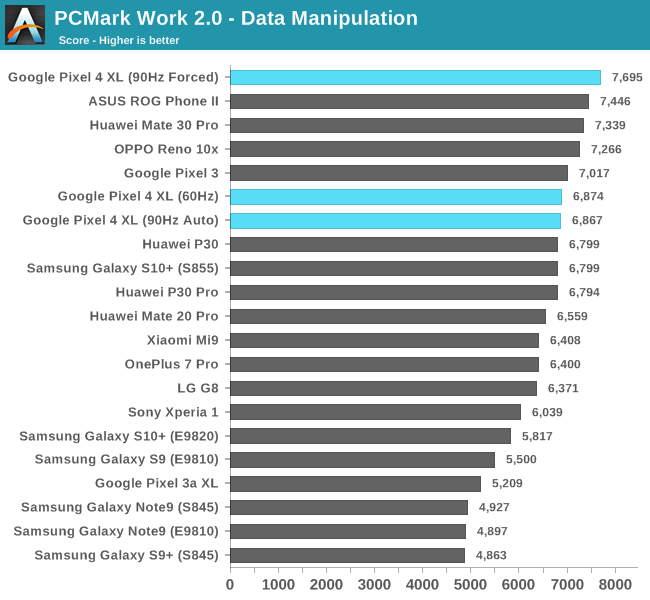
The data manipulation test is another odd one that I can’t really explain it performs better on the forced 90Hz mode over than the automatic 90Hz mode.
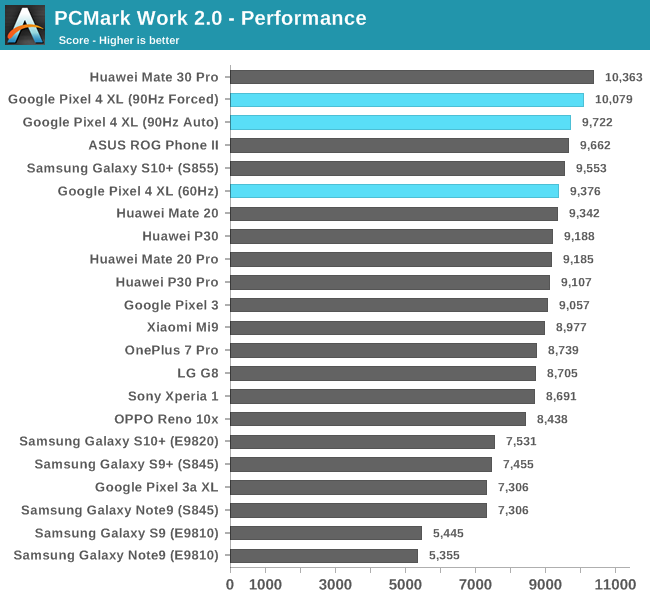
Finally, the Pixel 4 ends up high in the ranks in PCMark, really only trailing the Mate 30 Pro.
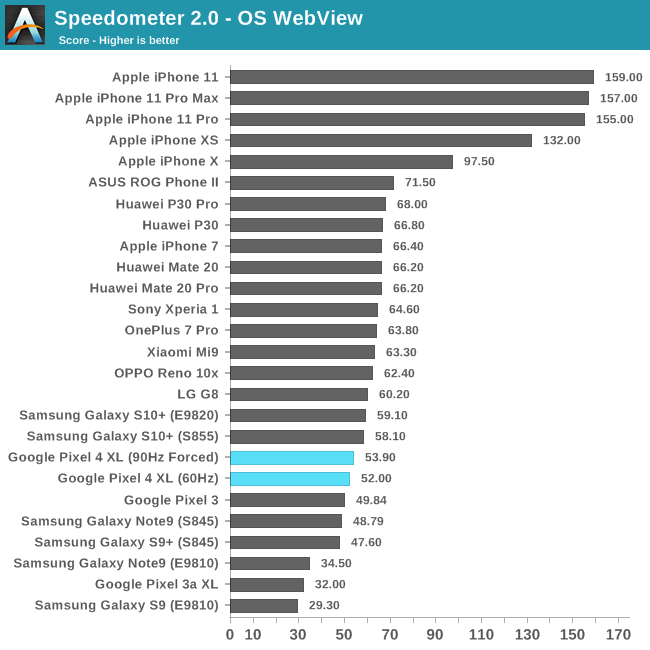
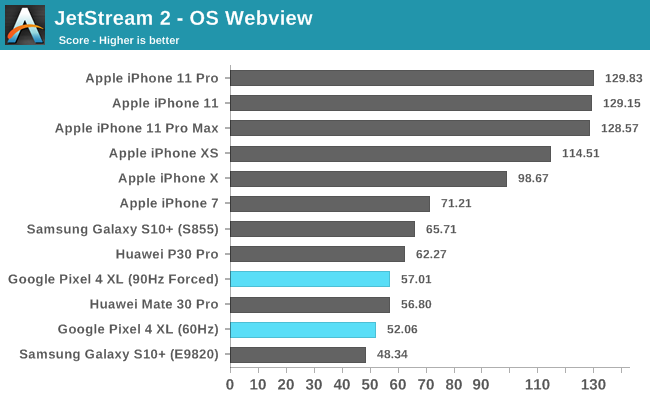
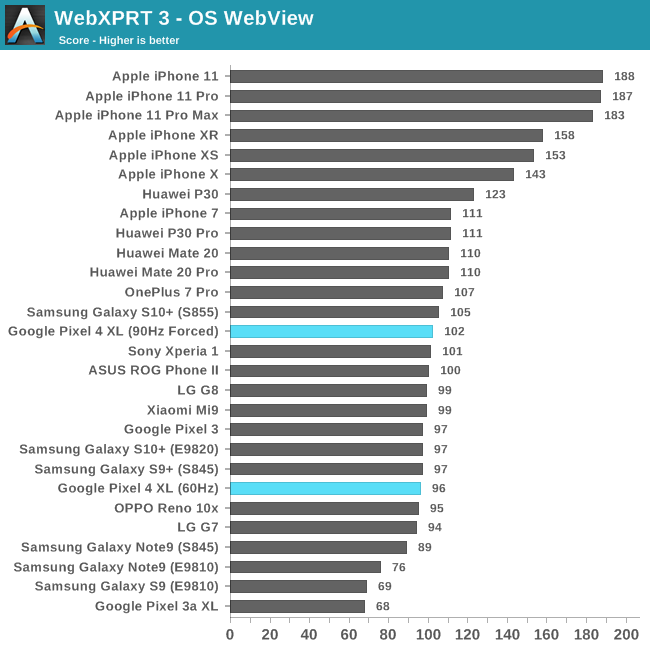
In the web benchmarks, the Pixel 4 performs quite average to actually quite bad, compared to what we’ve seen from other S855 phones. I’m really not sure why the degradation takes place, I’ll have to investigate this more once I have another S855 with Android Q.
Performance Conclusion
Overall, performance of the Pixel 4 is excellent, as expected. The big talking point here isn’t really the SoC or Google’s software, but rather the 90Hz screen of the phone. It really augments the experienced performance of the phone, making it stand out above other 60Hz phones this year.
That being said, unlike last year, I can’t say that the Pixel 4 is amongst the snappiest devices this year as that title was already taken by the new Huawei Mate 30 Pro with the newer generation Kirin 990. Unfortunately for Google, performance of the Pixel 4 will be a rather short-lived selling point as I expect the competition (which don’t already have the feature) to catch up with high refresh screens, and also surpass the Pixel as the new generation Snapdragon SoCs are just a month away from launch.










159 Comments
View All Comments
watzupken - Tuesday, November 12, 2019 - link
To me, the great Android experience is basically negated by poor battery life, QC and high price on the Pixel 3 and 4 series. Battery life for a mobile device is an essential requirement which this fails bitterly for a flagship phone. I agree it's a very gimmicky phone. It's rare to see reviewers being so harsh in their conclusion, but I feel Google really deserved a harsh wake up call and not be half hearted when they design a product.nostriluu - Tuesday, November 12, 2019 - link
I really think the author missed the point of the Pixel series. They are about Google's machine learning based smarts, which are well ahead of other providers. I plan to buy a Pixel 4 for the on-device transcription feature alone, though other features, not related to the the up-to-dateness of its SoC, are making me hesitate.kaesden - Thursday, November 14, 2019 - link
the one benefit of this phone vs a samsung, is getting a clean Android install without a bunch of bloatware installed on it by either samsung and/or the carrier's image, which allows for timely updates rather being 1-2 years behind all the time. However i dont see this as a compelling 'upgrade' from a pixel 3 at all.BabelHuber - Friday, November 15, 2019 - link
I think that this review is a bit too harsh.I agree that the Pixel 4's battery is a bit too small, but the 4 XL should have sufficient capacity.
The Pixel 3a XL I have lasts 3 days under light use and more than a day under heavy use, in fact I never was able to deplete the battery within a day before I came home, even when it was late in the eveing and used the phone excessively.
So with a bit worse battery runtime, the 4 XL should still be fine, perhaps except of the most extreme use cases.
I have played around with both the 4 and 4 XL and they both are very snappy and the face unlock works as advertised. It's not enough improvement for me to upgrade, though.
When we skip all the fancy gimmicks, there are a lot of pros for the Pixels:
- Bootloader unlocking and re-locking with fastboot, no crap like KNOX or warranty void
- Very easy to apply updates even when rooted
- Pixel users get new features first, like Google Lens
- Timely, monthly security updates (at least for 3 years)
- First to new Android versions via Google's beta channel
- Still a very good camera (in my opinion)
- The best software. I know this is subjective, but I e.g. cannot stand Samsung's or LG's launchers, phone apps, contacts etc.
The software features are the main point for me personally. I don't give a rat's a$$ about bezel sizes, popup cameras or slightly better screens, but I want the newest software and being able to easily root the thing.
Other people might put mnore emphasis on things I don't care for, but for me Pixels are the best.
MooseNSquirrel - Sunday, November 17, 2019 - link
Agree. The actual experience of owning and using the phone matters more than opinions about marginal differences in specs.Ive had the Pixel 3 since release and its great, especially the camera. Battery life is fine.
Frankly any of these top phones are great, regardless of who makes them. I just refuse to buy into Apples annoying walled garden and so will never own an Iphone.
Hubert Satheesh - Monday, November 18, 2019 - link
Well if Astrophotography and Soli radars are gimmicks, what about forced touch for 6s? I just remembered about the glowing tribute to force touch when it was launched in 6s in Anandtech. It praised how it's going to be the future of touch... only to be discarded by Apple a few yrs later as it was not practically useful. Though astrophotography is not a common occurence brushing it aside as gimmick makes one wonder whether theres an inherent bias towards anything Google and being lax on Apple!! Going by the same yardstick, the reviewer makes noise about pixels low display brightness. Now how many of us practically use our phone in bright sunlight to want that? Do we really need levels abouve 800 and 1000? So practicality is not the issue in most cases. As much experience and features a phone can pack, its better. If not you, someone will be benifitted by it. However it's of crucial importance for the pixel team to read such reviews as they are out of touch with reality. It's as if the team is living under a rock!! It's interesting to see how chineses OEMs with limited budget, resources and know how, easily surpass the mighty google in hardware and software design. Google needs a serious introspection.tranceazure1814 - Thursday, November 21, 2019 - link
When you can buy a OnePlus 7 standard model with snapdragon 855 and 256gb of UFS 3.0 and 8gig of ram and android 10 oxygen for 300 pounds,with far better battery life and decent camera why would you pay for a pixel 4coronafelix - Tuesday, August 25, 2020 - link
Really odd camera review, zero testing when it comes to subject focusing or how the cameras deal with actual subjects. Which makes sense considering the narrative mostly focuses on samsung's 'advantage' in dynamic range. (I do agree with their advantage there, but they have weaknesses as well). I think more categories needed to be tested for all cameras..TheinsanegamerN - Thursday, October 1, 2020 - link
It looks like a much better phone then the pixel 4, but for $700 I'd expect a headphone jack and at least a 5000 MaH battery, or no headphone and 5500+MaH. I've given up on google ever using SD cards again.